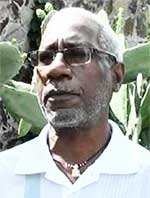
History always finds a way of repeating itself.
Take the question of how best to fight today’s proliferation of small arms into the country and the deadly spread of and use of firearms for criminal purposes, including murder.
Gun crime isn’t new here – or anywhere else in the Caribbean, for that matter. By the turn of the Century, guns had made their way onto the streets and into the hands of criminals in ways that worried all CARICOM governments, forcing national security ministers and police to find the best ways they could to address the matter.
Conflict mediation lessons had totally failed and young people, in particular, seemingly preferred to solve conflicts violently.
During its first two terms (1997-2006), the SLP administration, with then Senator Calixte George as Minister of Home Affairs and National Security, launched an innovative program of inviting persons with illegal firearms to submit them, with monetary reward and without prosecution.
The minister proudly periodically displayed the record hauls of illegal weapons and it was clear that illegal firearms were being traded-in by holders for cash.
But as the 2006 general elections approached, the program became the subject of partisan exchange, with the opposition UWP claiming it was a waste of time and money because, its propagandists claimed, the illegal firearms surrendered were being recycled by crooked cops who sold them to criminals, who then re-submitted them through the amnesty.
After the UWP won the 2006 general elections, it ended that gun amnesty, even though not saying exactly how it would replace it with a better mechanism.
Fast Forward 13 years and there are more guns than ever on the streets and in the hands of criminals. Illegal guns are easily available for purchase — and small arms (as well as not-so-small weapons) have become legal tender in the regional underworld as drug trade currency.
Earlier this week I read how the country is about to benefit from a new hi-tech approach to removing guns off the streets: by having containers arriving here from Miami loaded with the sort of camera technology that will trace illegal firearms contained therein.
That’s all well and good. But if this technology is only applied to ships leaving Miami or US ports heading for Saint Lucia, how about cargo from the UK and other countries?
And what about the non-containerized means of trafficking in small arms such as speedboats and other marine craft crafted for the region’s gun trade?
And what about the illegal firearms the police have been complaining of being associated with criminal Venezuelan arms traffickers taking advantage of the relative novelty of the police and national security mechanisms existing in Caribbean territories opening their doors and borders to those Venezuelans genuinely seeking better opportunities in greener pastures?
And most of all: what about the illegal firearms that have been flooding the local market from near and far since the gun amnesty ended in 2006?
Well, this is where the revolving door of history applies again: The current Minister of National Security, who was a Deputy police Commissioner when the original gun amnesty was activated, also earlier this week disclosed that the current UWP administration is or has quietly revived or is reviving the gun amnesty.
The TV clip I saw of Senator Hermangild Francis making the disclosure did not disclose exactly whether the amnesty will involve payments and guarantees of no prosecution.
I haven’t heard, read or seen any other public disclosure about it. But if it’s the same program with the same intent of using the same mechanisms to achieve the same ultimate objective, then isn’t this one of many examples of one government realizing it may have taken a bad decision in an earlier life and humbly returning to correct it?
That would be a normal and proud admission in any other field of politics than practiced here and across the Caribbean, where some ruling parties see and treat Regime Change as nothing more than an opportunity to erase whatever made a preceding one look good — and paint or repaint inherited projects in their own images and likeness.
Interestingly, the Chinese and Taiwanese have taught an interesting lesson in that regarding Saint Lucia, where China constructed a mammoth psychiatric institution at the request of a SLP government and it was completed by Taiwan under the next UWP administration.
Of course, the then Taiwan Ambassador initially claimed the construction site was somehow too complicated to be completed by Taiwan, citing concerns that were later shed, leading to Taiwan financing the end of the 90 percent completed China-built project.
If the Taiwanese could have swallowed that bitter pill despite reservation for Saint Lucia’s support, why can’t a least one Saint Lucia Government Minister come out and — even in the name of parliamentary and political bipartisanship – say: ‘We were wrong about an earlier decision and we are proud to not only admit, but to correct it!’?
What’s so hard about that?
Eh?














